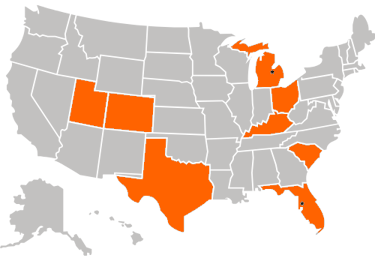Beware of Toll Scam Texts Targeting Michigan Drivers
At Spearpoint, we’re committed to keeping our community informed and protected. A widespread text message scam claiming unpaid toll fees is targeting Michiganders, and we want to ensure you have the information to stay safe. Here’s what you need to know about this fraudulent scheme and how to protect yourself.


What Is the Toll Scam Text?
Scammers are sending text messages posing as the Michigan Department of Transportation (MDOT) or toll services like E-ZPass, claiming recipients owe money for unpaid tolls. These messages often include alarming language like “violation notice,” “immediate payment required,” or “final warning,” threatening legal action or financial penalties if payment isn’t made promptly. Some even link to fake websites mimicking official MDOT pages to steal personal and financial information.
The reality? Michigan has no toll roads, and MDOT does not send payment requests via text or email. While certain state-owned bridges, like the Mackinac Bridge and Blue Water Bridge, have tolls, payments are handled by physical mail, not through text messages or license plate capture.
How to Spot the Scam
These scam texts are designed to look convincing, often using fake Michigan.gov URLs or official-sounding language. Here are red flags to watch for:
Urgent or Threatening Language: Messages may warn of legal action, vehicle impoundment, or credit score damage to pressure you into acting quickly.
Suspicious Links: Links may appear to lead to Michigan.gov or E-ZPass sites but have different URLs or unusual domain endings. Always check the URL carefully.
Requests for Personal Information: Legitimate government agencies, including MDOT, will not ask for personal or financial details via text, email, or phone. They also won’t request payments through gift cards, wire transfers, cryptocurrency, or payment apps.
Geographic Inaccuracy: Since Michigan doesn’t have toll roads, any text claiming unpaid toll fees is an immediate red flag.
What to Do If You Receive a Scam Text
If you receive one of these fraudulent texts, take these steps to protect yourself:
Do Not Click Links or Reply: Avoid clicking any links or responding to the message, as this could lead to malware or phishing sites designed to steal your information.
Delete the Message: Safely delete the text to avoid accidental interaction.
Report the Scam: Forward the text to SPAM (7726) to report it to your mobile carrier. You can also report it to the Federal Trade Commission at www.ftc.gov/complaint.
Contact Your Financial Institution: If you accidentally clicked a link or provided payment information, contact your bank or credit card provider immediately to secure your accounts.
Verify with MDOT: If you’re concerned, contact MDOT directly at 517-241-2400 or MDOT@michigan.gov to confirm no payments are owed.
Run Anti-Malware Software: If you clicked a link but didn’t enter information, scan your device with trusted anti-malware software to ensure it’s secure.
Stay Informed, Stay Safe
The Michigan Department of Transportation and Attorney General Dana Nessel are actively working to combat this scam, with warnings displayed on highway electronic signs and social media. By staying informed and cautious, you can protect yourself from these fraudulent schemes. We encourage Michiganders to stay vigilant and share this information with friends and family to prevent others from falling prey.
For more information on avoiding scams, visit the Michigan Attorney General’s consumer protection page or MDOT’s official website at www.michigan.gov/mdot.




